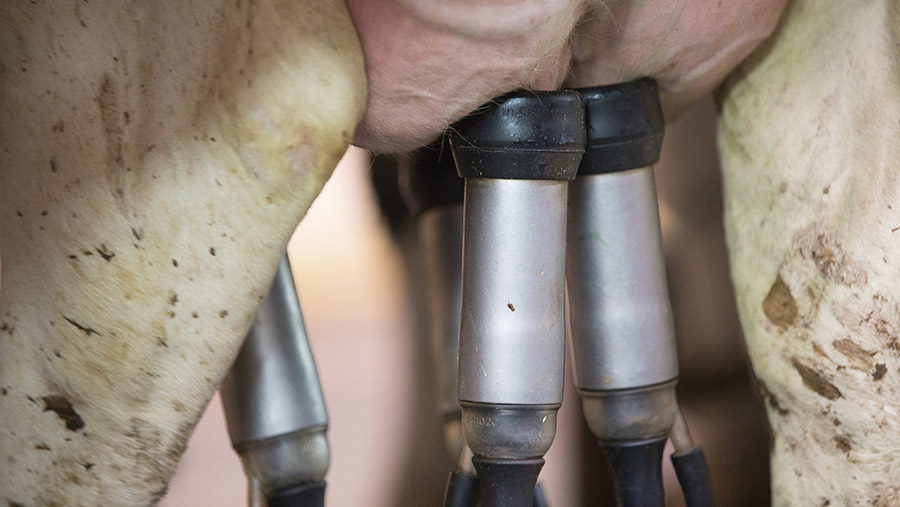Statutory minimum terms to be imposed on milk contracts
 © Tim Scrivener
© Tim Scrivener A crackdown on unfair practices in the dairy supply chain is promised by the government in legislation on a contracts code governing farmgate milk buying.
Defra expects to introduce a statutory code of conduct later this year but will allow industry time to adapt to any new requirements, with a lead-in time of about two years, said a spokesperson.
This follows a 12-week consultation, launched in June last year, seeking views from dairy farmers and processors across the UK on whether regulations could ensure fair treatment and how contracts and relationships could be improved.
This examined imbalances of power in the dairy supply chain, such as buyers having discretion to change prices and terms without notice or negotiation, and the exclusivity clauses in many contracts.
See also: What could reform of milk contract law achieve?
The consultation was introduced, two years after promising it, and after evidence gathered by the groceries code adjudicator in 2016 showed persistent unfair practices in the dairy sector.
A voluntary code of practice, launched in 2012, was not taken up by all processors and was widely criticised as not strong enough in protecting farmers.
What did the consultation cover?
The consultation questions covered pricing, volume and timescale issues, termination and notice periods, flexibility within contracts, bonuses and deductions, exclusivity clauses and methods of dispute resolution.
It also asked whether producer organisations should be promoted as a means of improving the bargaining balance in the supply chain.
The new statutory code of conduct will be introduced using section 29 of the Agriculture Act 2020 and will impose minimum terms on dairy contracts to ensure a fairer supply chain, said Defra.
“The responses to this consultation clearly demonstrated the need to introduce new regulations to require certain standards for contracts between those producing and buying milk for processing,” said a statement.
Minimum standards
This will establish minimum standards, but also provide businesses with the flexibility to adapt contracts to their individual circumstances, said Defra, and further engagement with industry would be needed to develop the standards.
It added that the consultation revealed that the distinctive circumstances in Northern Ireland may need to be reflected in regulations.
See also: Dairy farmers asked for views on mandatory milk contracts
In a joint statement, the four UK farming unions said dairy farmers had borne far too much of the risk in the dairy supply chain for far too long and that inappropriate contract terms were often at the root of the problems.
Unfair contracts
“Contracts have been weighted too heavily in favour of the milk buyer, who can change terms and pricing mechanisms, and even introduce price cuts without negotiation, while locking farmers into changes without recourse,” they said.
“The UK farming unions have been fighting for years to change the structure of how the dairy sector operates. We want more sustainable, progressive and equitable relationships between farmers and processors, so we can collectively tackle the issues we face.
“This is all the more crucial as we build back from the effects of Covid-19 and work towards new trading arrangements outside the EU.
“We have been monitoring closely how contracts work around the world. Although we recognise that our dairy market has some differences – for example, compared with Australia, we think there are lessons we can learn in building our own model,” they said.
Northern Ireland differences
“Even within the UK, there are clearly markets operating in different ways, such as Northern Ireland, and this will need to be taken into account when designing the new code.
“Although we are delighted with today’s announcement, this is only the beginning. We must now work hard to ensure we get this new code of conduct right and that it works.”
Farming minister, Victoria Prentis said: “This new code of conduct will crack down on unfair practices within the supply chain, supporting the dairy sector and ensuring that our dairy farmers remain competitive as they look to the future.”
Scottish respondents were the strongest supporters of putting transparency into contracts to protect farmers, said Scottish rural economy secretary Fergus Ewing.
In Northern Ireland, agriculture, environment and rural affairs minister Gordon Lyons said the Northern Ireland dairy sector differed to that in the rest of the UK because of the prevalence of co-operatives and the existing highly integrated cross-border supply chain with the Republic of Ireland
“Given the differences between the NI and GB dairy sectors, further stakeholder engagement will be required to ensure any potential legislation would be appropriate in Northern Ireland.”
Processor body Dairy UK said it was supportive of the introduction of a mandatory code of conduct on contracts, particularly the need for flexibility and transparency within the supply chain.
